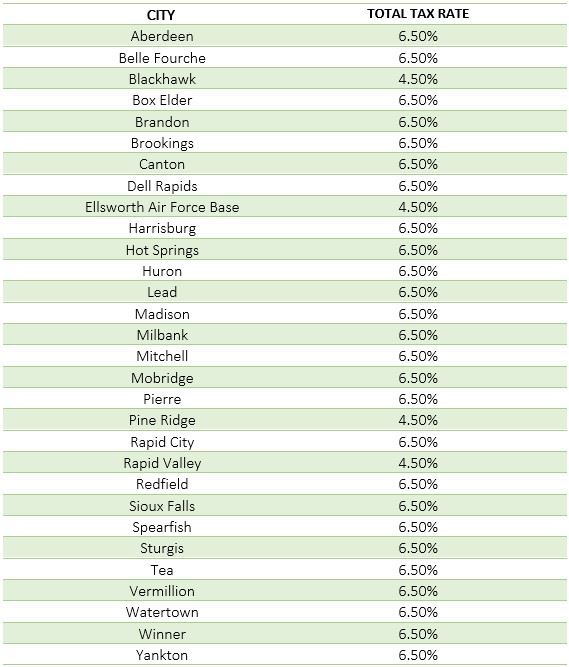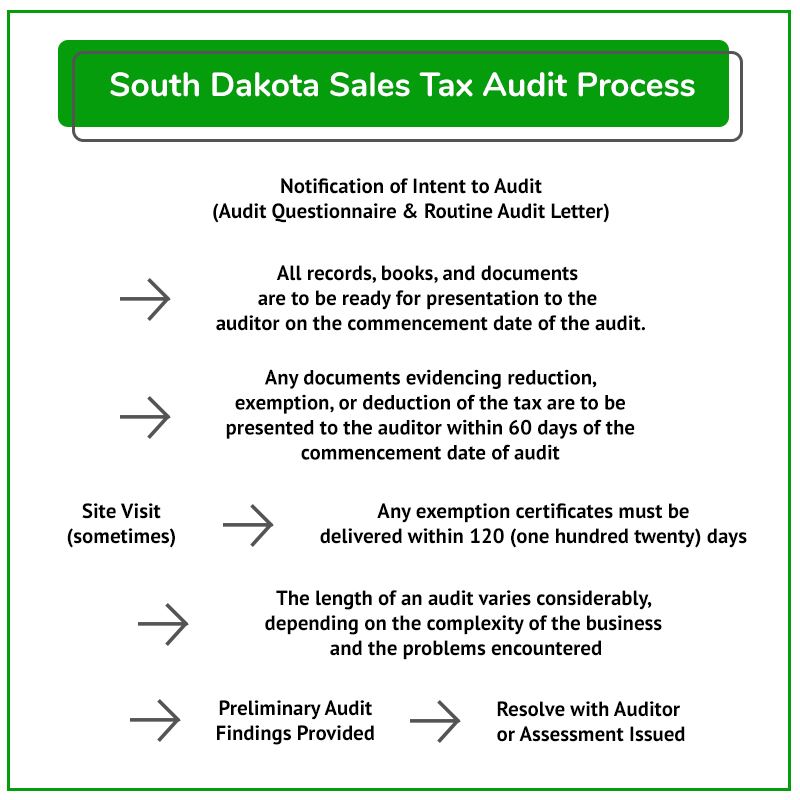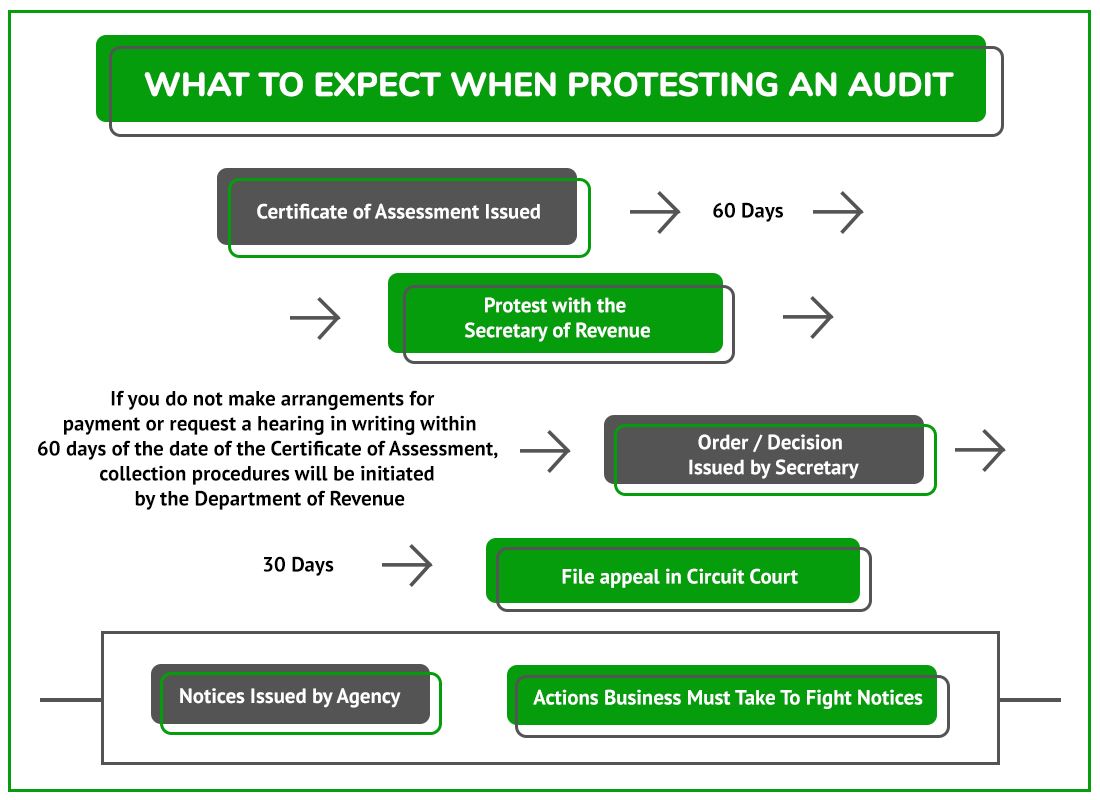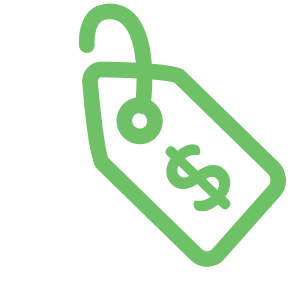
South Dakota Sales Tax & Audit Guide
Straightforward Answers to Your South Dakota Sales Tax Questions.
- Do I need to collect South Dakota sales tax?
- Should I be collecting or paying South Dakota use tax?
- What do I do if I should have been collecting but haven't?
- I received an audit notice. What should I do?
- Guidance on fighting a sales tax assessment in South Dakota.
Who Needs to Collect South Dakota Sales and Use Tax?
Like most states, to be subject to South Dakota sales tax collection and its rules, your business must:
1) Have nexus with South Dakota, and
2) Sell or use something subject to South Dakota sales tax.
How is Nexus Established in South Dakota?
According to the South Dakota Department of Revenue, any business with a physical presence in South Dakota must be licensed for sales tax collection. Gross sales or transactions include the sale of tangible personal property, any products transferred electronically, or services. The minimum thresholds listed below for remote sellers and marketplace providers do not apply to businesses with a physical presence in South Dakota.
Any of the following establishes nexus:
(1) Maintenance of any business location in South Dakota, including any office.
(2) Ownership of real estate in South Dakota.
(3) Ownership of goods in a public warehouse or on consignment in South Dakota.
(4) Ownership of goods in the hands of a distributor or other non-employee representative in South Dakota, if used to fill orders for the owner's account.
(5) Usual or frequent activity in South Dakota by employee or representative soliciting orders with authority to accept them.
(6) Usual or frequent activity in South Dakota by employee or representative engaged in a purchasing activity or the performance of services (including construction, installation, assembly, or repair of equipment).
(7) Operation of mobile stores in South Dakota
(8) Other miscellaneous activities by employees or representatives in South Dakota such as credit investigations, collection of delinquent accounts, and conducting training classes or seminars for customer personnel in operation, repair, and maintenance of its products.
(9) Leasing tangible property and licensing intangible rights for use in South Dakota.
(10) The sale of other than tangible personal property such as real estate, services, and intangibles in South Dakota.
(11) The performance of construction contracts or service contracts in South Dakota.
Additionally, businesses that do not have a physical presence in South Dakota can establish economic nexus by exceeding a certain annual sales threshold.
Economic Nexus (Wayfair Law) and Internet Sales in South Dakota
A remote seller without a physical presence in South Dakota must register with the Department of Revenue to secure a South Dakota Sales Tax Permit if one or both of the following criteria in the previous or current calendar year:
- Gross revenue from sales into South Dakota exceeded $100,000; or
- Sales for delivery into South Dakota in 200 or more separate transactions.
For more information, see How Remote Sellers are Determined
See South Dakota v. Wayfair for more information.
How is the $100,000 gross revenue threshold calculated?
Gross sales or transactions include the sale of tangible personal property, any products transferred electronically, or services.
Marketplace Providers
Marketplace providers must remit sales tax on all must collect sales and use taxes on all sales it facilitates in South Dakota if the thresholds of 200 or more transactions or $100,000 or more in sales to South Dakota customers. See Marketplace Tax Facts for more information.
Which Sales are Subject to South Dakota Sales Tax?
General Transactions
If you have nexus in South Dakota, the next step is determining whether the products or services you sell are subject to South Dakota sales and use tax.
Unless an item is specifically exempt, sales and rentals of tangible personal property are subject to South Dakota sales tax.
The rules seem simple, but many details make applying South Dakota’s tax rules to your business challenging. We recommend scheduling a time to review your specific situation with one of our sales tax professionals.
Common Exemptions from South Dakota Sales and Use Tax:
Items exempt from South Dakota sales tax include:
- Food Stamps & WIC Purchases
- Motor Vehicles Sales and Purchases
- Internet
- General Pollution Control Equipment
Additionally, some entities are exempt from collecting or remitting sales tax. Exempt entities must have the appropriate Exemption Certificate.
More information about exemptions can be found in the South Dakota Sales Tax Guide pages 11-13 and 64:06:03 Products – Interpretive Rules
Services
The South Dakota Department of Revenue has different rules and rates depending on the industry and the type of service. Find information about sales tax on specific types of services here:
Architects, Engineers, and Surveyors
Auctioneers, Auction Clerks & Auction Services
Veterinarians and Animal Specialties
Health Services, Drugs, and Medical Devices
Hotels, Motels, and Campgrounds
Communications Equipment - Installation & Repair
For more information, see: 64:06:02 Services – Interpretive Rules
Software
Many people have questions about the taxability of software as a service (Saas).
Many states already impose a tax on software as a service. As these options proliferate, states are moving to update their tax laws and, naturally, impose a tax.
To determine whether you need to collect tax on software sales, we highly recommend contacting one of our sales tax professionals to help you sort it out.
In South Dakota, there are only four reasons that a transaction may be exempt from sales and use tax, and unlike in some other states, the delivery method is not among them. Software and all digital products delivered within South Dakota are taxable.
The following general rules are used to determine where sales tax applies:
1. Items picked up at the seller’s location are subject to sales tax at that location.
2. Items delivered are subject to sales tax at the delivery address. Delivery may be by the seller or a customer-hired transportation company.
3. If items are delivered but the delivery address is unknown, sales tax applies based on the customer's address.
4. If items are delivered, but no delivery address or customer address is on file, then sales tax applies based on the address from which:
a. The seller shipped tangible personal property.
b. The product transferred electronically was first available for transmission by the seller; or
c. The seller provided the service.
Use tax applies to tangible personal property, electronically-transfer products, and services where the products are used, stored, or consumed.
Though not an all-inclusive list, here are some examples of products transferred electronically: music, books, videos, movies, newspapers, custom computer software, photos, clip art, etc.
Shipping & Handling
If the item being shipped is taxable, and there is a charge for the shipping as part of the order, the shipping charge is also taxable. The shipping charge will not be taxable if the item is not taxable.
Industry-Specific Guidance
While the general sales tax rules seem straightforward, applying those rules can get tricky when gray areas arise. The South Dakota Department of Revenue provides some specific guidance for the following industries:
Farm Machinery, Attachment Units, and Irrigation Equipment
Manufactured and Modular Homes
Motor Vehicle Repair & Services
Professional Employer Organization - Request for Approval
Rodeo & Rodeo-Related Activities
Determining Local Sales Tax Rates in South Dakota
The South Dakota sales tax rate is 4.5% for most retail sales, with the following exceptions:
Municipalities may impose a general municipal sales tax rate of up to 2%, and in addition to the municipal sales tax, they may also set a 1% municipal gross receipts tax.
Local Sales and Use Tax Tables
Here you can look up local South Dakota sales tax rates.

*Exact tax rates vary. Occupancy fees and taxes are not included in this table.
I Should Have Collected South Dakota Sales Tax, But I Didn't
Many of our competitors suggest Filing a Voluntary Disclosure Agreement
in each state. This is a one-size-fits-all solution that isn't always the best. Our sales tax professionals will work with you to determine your business's best and most cost-effective solution.
If you determine your business has nexus, but you have not collected South Dakota sales tax, here are your options:
1. Register and pay back taxes, penalties, and interest, or
2. Complete a VDA to cut penalties (and, in some cases, reduce your tax liability and avoid interest).
Here is what you need to know about each option to make the best decision for your business:
Option 1: Register to Pay Back Taxes, Penalties, and Interest
A VDA is not cost-effective if the past liabilities and penalties are minimal. Sometimes the best resolution for a business is to register with South Dakota and pay back taxes, penalties, and interest.
Be wary of the tax professionals recommending a VDA in these cases. They want to make a buck rather than look out for your best interests.
When to consider registration and payment:
- If you established nexus less than 3 or 4 years ago.
- The sales tax penalty is LESS than the professional fees charged for the VDA.
- Your business does NOT have a sales tax collected issue.
Beware: Registering does not generally end past liabilities.
If you're unsure what your past liabilities are, contact us. Our state tax professionals work with you so you can make the right choice for your business.
Option 2: Voluntary Disclosure Agreement (VDA)
South Dakota’s lookback period The standard lookback period is three years.
In many situations, voluntary disclosures are a valuable tool to reduce extended periods of past exposure.
The voluntary disclosure limits the lookback period to three years. So, if you should have collected sales tax over the past ten years but didn't, you may benefit from doing a VDA.
A VDA may be a good option for you if:
- You established nexus more than 3 or 4 years ago.
- You have a sales tax collected but not remitted issue.
- The sales tax penalty savings is MORE than the professional fees charged for the VDA.
What to Expect During an Audit
The typical audit process is shown in this flowchart. Detailed guidance for each South Dakota audit process stage follows in the sections below.

South Dakota regularly audits businesses required to charge, collect, and remit various taxes in the state. Many audits begin with a call from a South Dakota Department of Revenue sales tax auditor. Shortly after the call, your business will receive a Notification of Intent to Audit. This notification confirms that you were lucky enough to be chosen for a South Dakota sales tax audit.
Once the audit is complete, the assessment and the amount will be sent to you.
It is good to start with getting a state and local tax professional involved to prepare for the audit.
I Received a South Dakota Sales Tax Audit Notice. What Should I Do?
Businesses that receive a sales tax audit notice need to consider the following questions:
- If you don’t have sales tax audit experience, how can you trust that the state's auditor abides by the rules and follows proper procedures?
- How will you know when to provide documents or when to push back?
- Do you thoroughly understand your sales and use tax areas of exposure?
- Controlling the audit is paramount to limiting exposure and shaping the results. Are you confident in doing that on your own?
Unless you can confidently answer these questions, hiring a professional is most likely to be the best option.
Contact us to learn how our sales tax professionals can give you the peace of mind and confidence you’ll need during your audit.
Visit our resource pages for more information to help you make critical decisions during your South Dakota sales and use tax audit.
The Audit Overview & Selection Process
Statute of Limitations Extensions & Issues
Managing the Sales Tax Auditor
What to Expect from a South Dakota Sales Tax Auditor
Here is a summary of the general audit process:
- The auditor will conduct pre-audit research.
- The auditor will often schedule and perform an entrance conference.
- The auditor will request records (many of which the auditor is not entitled to and does not need)
Once the auditor receives the necessary records, they will compare your South Dakota sales and use tax returns to your federal income tax returns or bank statements to determine whether you reported all applicable or gross sales on your South Dakota sales tax return(s).
NOTE: A slight error in how the tax was charged on even a single type of transaction can add up to a significant sales tax liability.
Once the auditor is confident all sales are accounted for, they will:
- Review your exempt and out-of-state sales.
- Conduct a use tax audit – the auditor will request accounts documents to ensure you adequately paid use tax on applicable purchases.
Common areas audited include:
- Advertising Expense
- Auto & Truck Expense
- Repair and Maintenance
- Office Expense
- Miscellaneous Expense
- Supplies
- Equipment
If the auditor determines that a 25% discrepancy has occurred in a single reporting period and it is past the 3-year statute of limitations, the Department of Revenue can make audit assessments in the period the discrepancy occurred up to 6 years from the date the return was due or filed, whichever period expires later.
If a business buys an item online without paying use tax, the business is still obligated to remit the tax to South Dakota. Believing otherwise often leads to shocking results for the unsuspecting taxpayer during an audit. Here is more information on South Dakota Use Tax.
If you have questions about your situation, contact us to discuss it with one of our tax professionals.
After the Audit – Understand and Defend Your Businesses Rights
Upon completion of the audit, there will usually be an exit conference with the auditor. The auditor will produce an audit report with corresponding work papers to support the South Dakota sales and use tax assessment.
It is advisable to have a sales tax professional present during this meeting. This is your first opportunity to see the auditor's findings. You'll want to push back on areas where they have overstepped their bounds or misapplied South Dakota's sales tax laws.
It's best to hold off on agreeing to the sales tax assessment until a sales tax professional has reviewed it for issues that should be challenged.
| Many businesses wind up drastically overpaying the state because the business owner or in-house accounting personnel weren't well versed in the sales tax laws that, if challenged, could have reduced their sales tax liability. |
We'll cover the process of challenging a South Dakota sales tax audit assessment in detail in the following sections.
Contesting Audit Findings with the Auditor
South Dakota Sales Tax Audit Protest Process Flow Chart

NOTE: If the deadlines are missed, it can be tough to get the case reopened.
After an audit, the auditor will issue a Certificate of Assessment (AKA the audit report). It's essential to review and understand its implications carefully.
The audit report:
- Details of the auditor's findings
- Describes any proposed audit adjustments
- Shows the amount of tax, interest, and penalty due
If you disagree with the proposed changes, you may request an informal conference with the auditor. You must request an informal conference and attempt to resolve the case with the auditor.
Audit Closing Conference
The taxpayer has a short period to contest the findings with the auditor. Any issues with the results are handled as follows:
1. Issues related to exemptions, proof of tax paid, and calculations are worth addressing with the auditor.
2. Legal interpretations of sales tax law are often not resolvable at this stage.
After this conference, the auditor will adjust the audit assessment, and a Notice of Determination will be issued.
If you cannot resolve this with the auditor, the next step is to appeal/protest the issue.
Appeal/Protest with The South Dakota Department of Revenue
Protest Rights and Audit Finding Confirmation
If you believe the assessment is based on a mistake of fact or an error of law, you may request a hearing before the Secretary of Revenue in writing 60 days from the date of the Certificate of Assessment.
The appeal must state why the assessment is incorrect and be sent to the Secretary of Revenue. Taxpayers may not request hearings for assessments of penalties or interest.
If you have received a Certificate of Assessment and haven't talked to someone experienced in South Dakota State tax, now is the time. Do it before these deadlines pass.
Final Decision
You will receive a notice of hearing stating the time and place of the hearing and the issues to be considered.
Then, an attorney from the Department of Revenue will hold a prehearing conference, usually by phone, with you or your representative and the hearing examiner to decide what issues will be covered at the hearing.
After the hearing, you will receive copies of the findings of fact, the conclusions of law, and the order.
Settling a South Dakota Sales Tax Liability
After any critical notices are issued, settling your South Dakota sales tax case with the South Dakota Department of Revenue is possible by filing a South Dakota Offer in Compromise. The business must meet specific criteria to qualify, but you can get better results negotiating here than with the auditor. However, knowing a fair settlement from an unreasonable settlement will be challenging without experience and knowledge of South Dakota tax laws.
DO NOT attempt to negotiate a settlement without an experienced South Dakota state and local tax lawyer or other professional.
Contest a South Dakota Jeopardy Assessment
South Dakota may issue a Notice of Jeopardy Determination in certain situations.
The jeopardy assessment gives the South Dakota Department of Revenue the right to try to collect immediately.
Due to the jeopardy nature, the taxpayer only has a very short time to contest the assessment and must place a security deposit to fight the issue.
Administrative Hearing with The South Dakota District Court
Like many states, South Dakota does not have formal administrative hearing or a tax court. As part of the appeal to the Secretary of Revenue, if the case is unresolved, it proceeds to a hearing before the agency. Unfortunately, during the hearing, the agency acts as judge, jury, and executioner and it can really feel as though you have no realistic shot of winning at this level. Nonetheless, although the hearing is relatively informal, it is critical to develop facts and preserve the record, especially if you wish to continue fighting the case.
Although not required, it is strongly encouraged to have an attorney or sales tax professional handling your case at this phase, as not developing the case record can really cost your business as the case proceeds.
Our team has handled hundreds of administrative court cases. It can help your company receive the resolution you are entitled to. Get in touch with us today.
Other South Dakota Sales Tax Resources
South Dakota Department of Revenue Sales Tax Website
2022 Subject - Retail Sales and Service Tax
Reviews

-
"Take Control of your sales tax with easy-to-use DIY tools. Get the guidance you need - without the high cost of full-service support."
Meet David, the Auto Repair Shop Owner (DIY)
- The DIY Business Owner -
"Get expert answers when you need them. Our on-demand consulting service connects you with tax professionals for quick, reliable advice—without long-term commitments."
Meet Mark, the Business Owner Who Needs Quick Answers
- The On-Demand Consultant User -
"Outsource your sales tax headaches to proven experts. Our full-service solutions handle compliance, audits, and dispute resolution—so you can focus on growing your business."
Meet Greg, the CFO of a Multi-State Manufacturing Company
- The Managed/Enterprise CFO -
"Stay in control while getting expert help when you need it. Our guided sales tax solutions give you access to professionals for compliance, audits, and appeals—without the cost of full-service management."
Meet Kris, the Multi-Store Gas Station & Convenience Operator: Multi-Location Owner (Guided Support)
- The Guided Business Owner -
"Jerry is the best!"
Jerry is the best! I made the mistake thinking I could deal with the use tax auditor on my own not realizing that I would be ...
- Gary O. -
"Sales Tax Helper Can Make Miracles Happen"
Sales Tax Helper can make miracles happen. Jerry was able to wipe hundreds of thousands of dollars off a NY sales tax bill ...
- Zalmi D. -
"I Will Definitely Be Using His Services Again"
Jerry was very helpful and listened to all our concerns. I will definitely be using his services again.
- Joyce J. -
"Representing Our Company Professionally"
Owning a Texas car dealership is demanding work, so taking on a Texas Sales Tax Audit was a daunting task for us – we didn’t ...
- Ata A.
